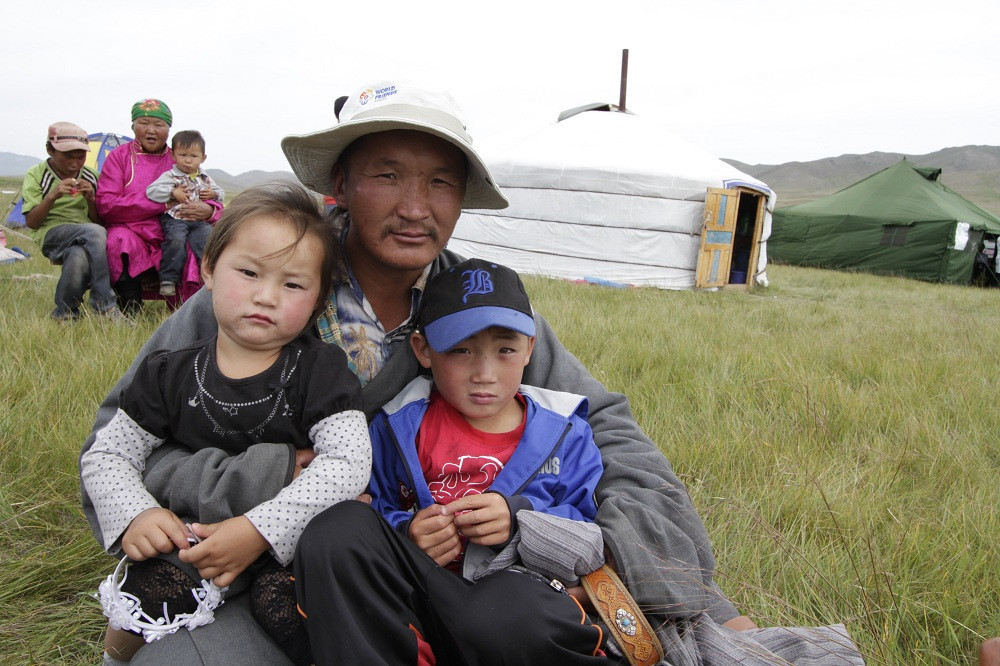Extreme winter weather zud threatens Mongolia; People in Need is preparing aid for local farmers
Published: Dec 21, 2015 Reading time: 4 minutes Share: Share an articlePrague, Ulaanbaatar (21 December 2015) – Mongolia is facing severe freezing winter conditions, which in Mongolian is called zud. After an extremely dry summer, which caused herdsmen to have a shortage of foodstuff for their livestock for the winter, authorities are worried that freezing temperatures will kill hundreds of thousands of weakened animals. Livestock is the basic source of livelihood for 300,000 Mongolians, who are pastoral farmers. In case the harsh winter comes, People in Need is prepared to distribute food, fuel and insulation materials to the neediest families. It also wants to help the herdsmen who would be forced to move to cities because of loss of their livelihoods. It has been coordinating the aid preparations with Czech branches of Caritas and ADRA, which also have offices in Mongolia, as well as with the local branch of the Red Cross and the Mongolian National Emergency Management Agency.

Zud usually strikes after very dry summers, which occured this year in Mongolia. “The draughts affected the rural population because there was not enough grass on the pastures for the livestock to feed on and gain enough strength for the long winter. The farmers were also unable to collect enough feed for the animals to stock up for the winter, and neither could the authorities,” says the coordinator of the People in Need office in Mongolia, Quentin Moreau. When after a summer like this there is heavy snowfall, which prevents livestock from being able to graze, and temperatures dip to minus 40 degrees Celsius, the situation becomes very serious.
Snow has cut off herdsmen from sources of food and health care
According to the Mongolian Red Cross, temperatures in some areas are already around minus 30 degrees Celsius. First snow came early this year as well, and pastures are covered with half-a-meter in regions where it normally does not snow at all. The government has not officially declared zud yet, but in many places the situation is already critical. The Red Cross and the National Emergency Management Agency have announced that 12 out of 21 provinces and 97 villages are snowed under and are facing incredibly difficult winter conditions. “Snow is currently preventing millions of livestock from grazing. Herders and their families are also under threat, especially in outlying regions, having been cut off from sources of food and health care,” explains Quentin Moreau, adding that up to 10 per cent of people in affected regions are threatened in this way.
According to weather forecasts, up to 40 per cent of the country will be facing extreme winter conditions in the upcoming weeks and according to the Red Cross, 80 per cent of provinces are not prepared even for a normal winter because of the drought in the summer months. In Mongolia, 300,000 people are dependent on pastoral farming, and during zud they risk losing their entire herds of livestock and a result their source of livelihood. Herders’ families are then forced to move to slums on the outskirts of Ulaanbaatar or other cities. There they often fall victim to unemployment, alcoholism or extreme poverty.
Aid for herders affected by zud and loss of livelihood
The People in Need mission in Mongolia, together with partner organisations, the National Emergency Management Agency and the Red Cross, is constantly monitoring the situation in the countryside. “In case the situation worsens, we are prepared to distribute food, fuel and materials for housing insulation to the families most in need,” says Quentin Moreau. The People in Need team is also planning to help people who would otherwise be forced to migrate to another village, city or the capital as a result of losing their source of subsistence.
“The aid has to be multifaceted. We are currently considering involving thsee people in public works. Together with the local agricultural cooperative, we are preparing a pilot solidarity program and we would like to help people take advantage of the existing social benefits system,” explains Moreau. He says that People in Need will most likely be helping in the Arkhangai province where it has partners, but depending on the situation, it will also provide aid in other badly affected regions. It will be coordinating its efforts with the Czech branches of the NGOs Caritas and ADRA, which also have branches in Mongolia.
This will not be the first time that People in Need will be providing aid during zud. The last time zud struck in 2010 and killed millions of livestock, the People in Need team distributed aid in Tsenkhermandal and Umnudelger in the Khentii province. People in Need provided financial aid for food, winter clothing and fuel to 39 farmers’ families, who lost all of their livestock during zud. The main concern of those who were left with at least some animals, was to prepare enough feed for the next winter. People in Need helped them as well.



